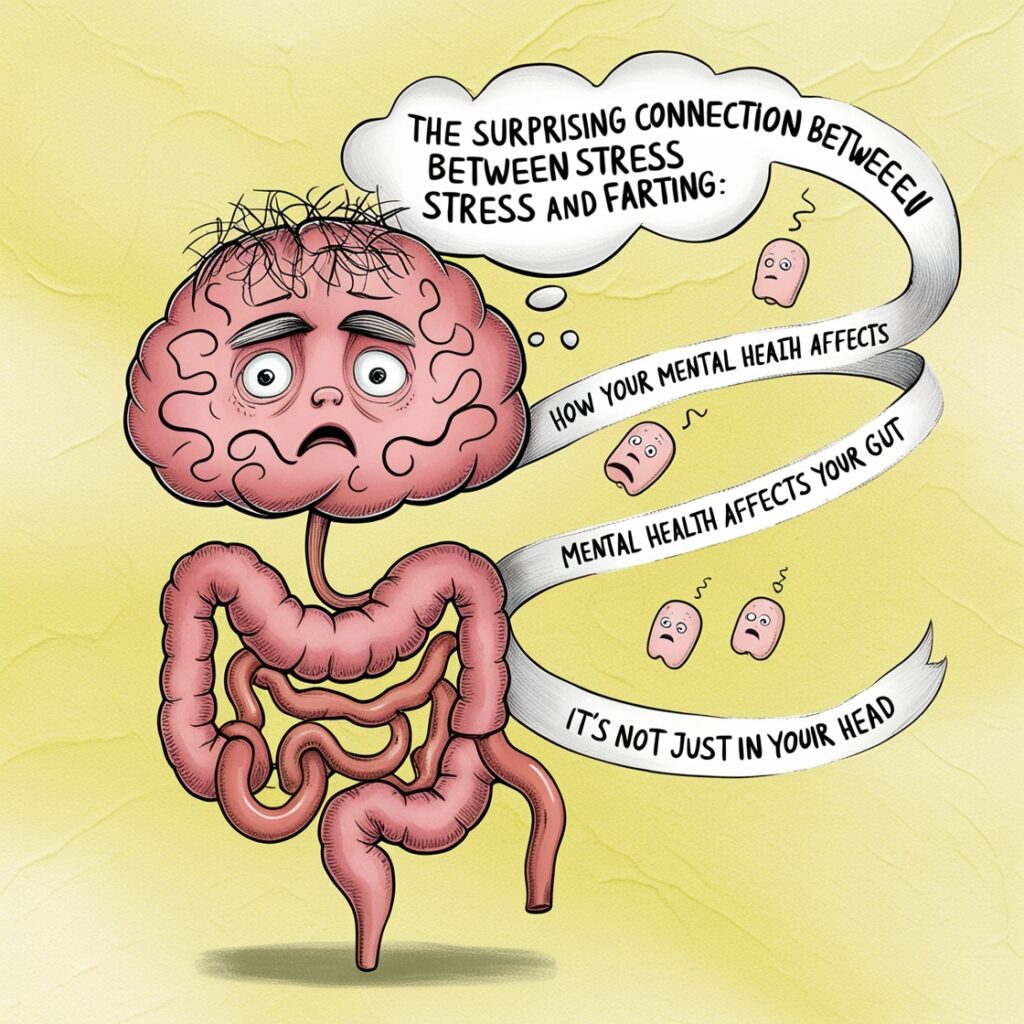We’ve all been there—feeling stressed, anxious, or overwhelmed, and suddenly, our digestive system decides to join the party. From an upset stomach to increased gas, stress can have a surprising impact on your digestion, including how often (and how loudly) you fart. But what exactly is the connection between stress and farting, and why does your mental health affect your gut?
In this post, we’ll dive into the fascinating relationship between stress and digestion, explaining why your mental state can lead to more frequent farts, how stress affects your gut, and what you can do to manage stress-induced gas. Ready to calm your mind and your stomach? Let’s get started!
Why Stress Affects Your Digestion (and Your Farting)
When you’re stressed, your body goes into fight-or-flight mode, a natural response designed to help you deal with danger. While this response is helpful in the short term (like running from a wild animal), chronic stress can wreak havoc on your digestive system. Here’s why:
1. Stress Slows Down Digestion
When your body is under stress, it diverts energy away from non-essential functions, like digestion, so that it can focus on dealing with the perceived threat. This causes your digestive system to slow down, leading to bloating, constipation, and yes—more gas. The slower your digestion, the more time food has to ferment in your intestines, producing gas that eventually needs to be released as a fart.
2. Stress Increases Swallowed Air
When we’re anxious or stressed, we tend to breathe more rapidly and often through our mouths. This can cause us to swallow more air, which gets trapped in the digestive system and contributes to gas buildup. This swallowed air eventually makes its way out as burps or farts.
3. Gut Microbiome Imbalance
Stress also affects the balance of bacteria in your gut, known as the gut microbiome. A healthy gut microbiome helps with digestion, but stress can lead to an imbalance, causing more fermentation of undigested food and producing extra gas.
Bottom Line: When you’re stressed, your body’s natural processes are thrown off balance, slowing digestion and increasing gas production.
How Stress-Induced Farting Manifests
Stress-induced farting can show up in a few different ways, depending on how your body reacts to stress. Here are some common signs that your farts might be linked to stress:
1. More Frequent Farts
If you’ve noticed that you’re farting more often during periods of stress or anxiety, it could be a sign that your body is slowing down digestion, leading to more gas buildup.
2. Increased Smell
Stress-related digestive issues often lead to fermentation of undigested food, which produces more sulfur-containing gases (like hydrogen sulfide). These gases are responsible for that rotten egg smell, so if your farts are smellier than usual, stress could be the culprit.
3. Loud, Sudden Farts
Because stress causes you to swallow more air, you might experience louder farts as this extra air is released from your digestive system. Loud, sudden farts are often the result of trapped air making its way out quickly.
4. Bloating and Discomfort
Stress can cause bloating, which might make your farts feel more uncomfortable or even painful. This is because the extra gas builds up in your intestines, leading to pressure and discomfort.
Managing Stress to Reduce Farting
While stress-induced farting is normal, there are ways you can manage your stress levels and reduce the digestive side effects. Here are some practical tips to help you manage both stress and gas:
1. Practice Deep Breathing
One of the easiest ways to calm your mind and reduce swallowed air is to practice deep breathing. Slow, deep breaths help regulate your breathing and prevent you from gulping air, which can lead to gas buildup.
Tip: Try a simple breathing exercise like the 4-7-8 technique: Inhale through your nose for 4 seconds, hold your breath for 7 seconds, and exhale through your mouth for 8 seconds. Repeat this cycle a few times to help calm your nervous system.
2. Eat Mindfully
When you’re stressed, you might be more likely to eat quickly or mindlessly, which can lead to swallowing more air. Mindful eating helps you slow down, chew your food thoroughly, and reduce gas buildup.
Tip: Take your time during meals, chew each bite carefully, and focus on the flavors and textures of your food. This can improve digestion and reduce the amount of air you swallow.
3. Stay Hydrated
Drinking plenty of water can help improve digestion and reduce bloating, especially during stressful times. Water keeps your digestive system moving smoothly and helps prevent constipation, which can contribute to gas buildup.
Tip: Try drinking a glass of water before meals to help prevent overeating and reduce the chances of gas forming in your intestines.
4. Practice Stress-Relief Techniques
Incorporating stress-relief techniques into your daily routine can help reduce the overall impact of stress on your body, including your digestion. Techniques like yoga, meditation, or even a short walk can help calm your nervous system and improve your gut health.
Tip: Start with just 10-15 minutes of meditation or yoga a day, focusing on relaxation and deep breathing. Over time, you’ll notice improvements in both your stress levels and digestion.
5. Monitor Your Diet
Certain foods can make stress-induced farting worse, especially if they’re already known to cause gas. Try to limit gas-producing foods like beans, broccoli, cabbage, and carbonated drinks when you’re feeling stressed.
Tip: Keep a food diary to see if specific foods are contributing to your stress-induced gas. You can also track how you feel after meals and adjust your diet accordingly.
Track Your Stress-Induced Farts with the Personal Fart Tracker
Curious about whether stress is affecting your farting habits? Use FartRanker’s Personal Fart Tracker to log your farts and identify any patterns related to stress. By tracking how often and when you fart, you can pinpoint whether stress is playing a role in your gas production.
Here’s how the Personal Fart Tracker can help you:
- Log Stress Levels: Record your stress levels throughout the day to see how they correlate with your farting patterns.
- Track Frequency and Volume: Log each fart’s frequency, volume, and smell to see if stress is causing changes in your gas.
- Analyze Trends: Use the data to identify any patterns, such as increased farting during high-stress periods, and make lifestyle changes to improve your digestion.
Click here to start using the Personal Fart Tracker and take control of stress-related gas!
Conclusion:
Stress and digestion are closely linked, and it’s not uncommon for stress to lead to increased farting, bloating, and discomfort. By understanding how stress affects your gut and using techniques to manage your mental health, you can reduce stress-induced gas and improve your overall digestion. Don’t forget to track your farting patterns with FartRanker’s Personal Fart Tracker to gain insights into how your stress levels impact your body—and your gas.



I can totally relate to this post! A few years back, I was juggling a stressful job, a toddler, and my cat’s newfound habit of knocking over every plant in the house. One particularly rough week, I realized that my stomach was sounding like a brass band at a parade. Turns out, my gut was trying to communicate my stress levels, but in the most entertaining way possible—let’s just say the kids weren’t the only ones letting loose!
I remember one afternoon I had to give an important presentation at work. As I stood there, trying to impress everyone with my knowledge and poise, my stomach made a noise that could only be described as the sound of a deflating balloon. Everyone turned to me, eyebrows raised, and all I could do was awkwardly laugh and say, “Well, I guess my body is just as excited as I am!” After that, I realized that mental health really does have a way of making its presence felt—both physically and audibly!
Now I make sure to take breaks, meditate, and maybe even indulge in some chamomile tea when I feel the stress creeping in. I’ve noticed that when I’m in a more relaxed state, my gut behaves much better. So, if you ever hear me in a meeting, just know it might not be the lunch talking—sometimes it’s just the stress trying to escape in the most unpredictable ways!
If only stress could just be farted away! I guess we can consider it a “blow-off” valve for mental tension. Just a reminder: it’s all natural, and sometimes laughter truly is the best medicine—even if it comes with a side of giggles over gut grumbles!